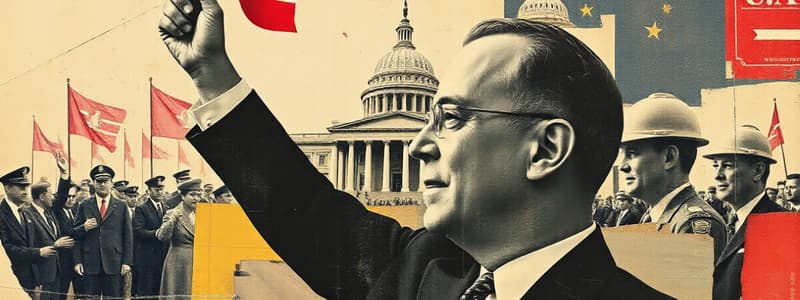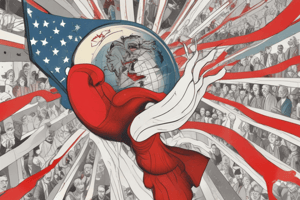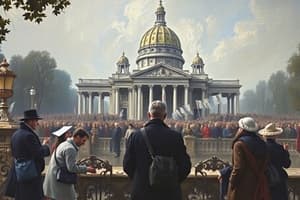Podcast
Questions and Answers
What does the term 'Poli Sci' refer to?
What does the term 'Poli Sci' refer to?
- The study of power and politics (correct)
- The exploration of cultural history
- The analysis of social behavior
- The study of economic systems
Which year marked the introduction of women's voting rights in the United States?
Which year marked the introduction of women's voting rights in the United States?
- 1971
- 1920 (correct)
- 1865
- 1965
In the context of democracy, what does 'Demos' refer to?
In the context of democracy, what does 'Demos' refer to?
- Government officials
- Lawmakers
- Political parties
- The people (correct)
How is 'Indirect Democracy' primarily characterized?
How is 'Indirect Democracy' primarily characterized?
What document is associated with the establishment of constitutional monarchy in England?
What document is associated with the establishment of constitutional monarchy in England?
What is one of the primary challenges to majority rule in democratic systems?
What is one of the primary challenges to majority rule in democratic systems?
Which year did the US Constitution begin its formal enforcement?
Which year did the US Constitution begin its formal enforcement?
What is one effect of the 'power of the purse' established by the Magna Carta?
What is one effect of the 'power of the purse' established by the Magna Carta?
What was the significance of the Albany Plan of Union proposed by Ben Franklin?
What was the significance of the Albany Plan of Union proposed by Ben Franklin?
Which document demonstrated the growing colonial sentiment of 'no taxation without representation'?
Which document demonstrated the growing colonial sentiment of 'no taxation without representation'?
Which Enlightenment thinker is associated with the idea of the social contract?
Which Enlightenment thinker is associated with the idea of the social contract?
What was the primary consequence of the Intolerable Acts imposed by the British government in 1774?
What was the primary consequence of the Intolerable Acts imposed by the British government in 1774?
What event is marked by the clash at Lexington and Concord in 1775?
What event is marked by the clash at Lexington and Concord in 1775?
Which term describes the government structure established by the Articles of Confederation?
Which term describes the government structure established by the Articles of Confederation?
What was a significant outcome of Shays' Rebellion in 1786?
What was a significant outcome of Shays' Rebellion in 1786?
Which act imposed a direct tax on printed materials in the colonies?
Which act imposed a direct tax on printed materials in the colonies?
Study Notes
What is Political Science?
- Political Science studies power.
- The U.S. President is the most powerful position in the country.
Power and Impact
- Government policies affect individuals through taxes, prisons, and the use of force.
- The U.S. spends 25% of its Gross National Product (GNP) on taxes, compared to 50% for Sweden.
- The U.S. has 2 million people in prison and policing is the sole legitimate use of force.
Politics - Good or Bad?
- The text argues that while politics can seem corrupt, it has historically led to progress.
- Examples of progress include the abolition of slavery, women's suffrage, the Civil Rights movement, and the expansion of voting rights to 18-21 year olds.
- Despite progress, past political systems relied on violence.
Democracy in the U.S.
- The U.S. system of government is a good example of a democracy, having lasted over 250 years.
- The U.S. adopted its Constitution in 1787, which has remained relatively stable, resulting in only one system since its creation.
- Notable events in U.S. political history include the Declaration of Independence, the Constitution, and the peaceful transfer of power between presidents since 1800.
- The U.S. has been able to adapt to changing demographics and societal values by incorporating minorities, such as Black Americans, Latinos, and women, through amendments.
Forms of Democracy
- The word "democracy" comes from the Greek words "demos" (people) and "kratia" (form or rule).
- The text describes two forms of democracy: Direct and Indirect.
- Direct Democracy involves people directly making laws.
- This was practiced in Ancient Greece by Athens and involved assembly voting by all free men.
- Modern examples include town hall meetings, Swiss cantons, and referendums.
- Indirect Democracy is the most common form, where representatives make laws on behalf of the people, solving the problem of direct democracy's potential unwieldiness.
- Examples include the Roman Republic and the U.S. Constitution.
Ideals of Democracy
- The text discusses ideals of democracy like freedom, equality, and participation.
- Freedom is contested, as it can be viewed as freedom from the government or freedom through the government.
- Equality can refer to equal opportunity or equal outcome.
- Political participation raises questions about who can run for office, with specific requirements outlined, and who can vote.
Roots of U.S. Democracy
- The U.S. democracy's roots can be traced back to England and the concept of the 'Rights of Englishmen.'
- These rights include the right to trial by jury, freedom from arbitrary arrest, and the right to consent to taxes through parliament.
- Magna Carta (1215), known as "Great Charter," played a pivotal role in establishing these rights.
- The U.S. adopted aspects of the British bicameral legislative system (two houses of parliament).
Colonial Period and Institutions
- During the colonial period (1607-1775), three types of colonies emerged:
- Royal Colonies: Governed directly by the British Crown
- Charter Colonies: Ruled by charters granted to colonists
- Proprietary Colonies: Granted to individuals by the Crown
- Virginia House of Burgesses (1619) and Mayflower Compact (1620) were early examples of self-governance in the colonies.
- The text states that the U.S. has more rights than Great Britain today.
Enlightenment Ideals and Timeline to Revolution
- The text highlights influences from the Enlightenment.
- Montesquieu's concept of the separation of powers advocated for dividing governmental authority.
- John Locke's social contract theory emphasized a two-way relationship between rulers and the ruled, with the right to revolt against an unjust government.
- French and Indian War (1754) created tensions between the colonies and Great Britain.
- Albany Plan of Union, proposed by Benjamin Franklin, aimed to unite the colonies, but was rejected by both sides.
- 1763: Britain and the colonies won the war, but the subsequent financial burden and taxation issues created a rift.
- The 'No taxation without representation' slogan emerged, arguing for representation in Parliament.
- The text lists various acts and events leading to the Revolution:
- Sugar Act (1764) - tariffs on goods
- Stamp Act (1765) - tax on documents
- Townshend Acts (1767) - boycotts against Britain
- Boston Massacre (1770)
- Boston Tea Party (1773)
- Intolerable Acts (1774) - punishment for Boston
- 1st Continental Congress (1774) - meeting to protest
- Lexington/Concord Battle (1775)
- 2nd Continental Congress debated independence.
- July 4, 1776: Declaration of Independence
- 1777: Articles of Confederation (created a weak central government)
Challenges to U.S. Independence
- The text notes that the U.S. lacked a strong central government under the Articles of Confederation.
- This resulted in financial difficulties, disputes between states, and a lack of a common currency.
- Shays' Rebellion (1786) is cited as an example of the need for a strong federal government to maintain law and order.
- The rebellion, a response to economic difficulties, highlighted the weaknesses of the Articles of Confederation and the need for a more unified government.
Studying That Suits You
Use AI to generate personalized quizzes and flashcards to suit your learning preferences.
Description
This quiz covers the foundational aspects of Political Science, including the concept of power, the impact of government policies, and the evolution of democracy in the United States. Explore key historical movements and the complex relationship between politics and societal progress. Understanding these dynamics is essential for grasping the current political landscape.




